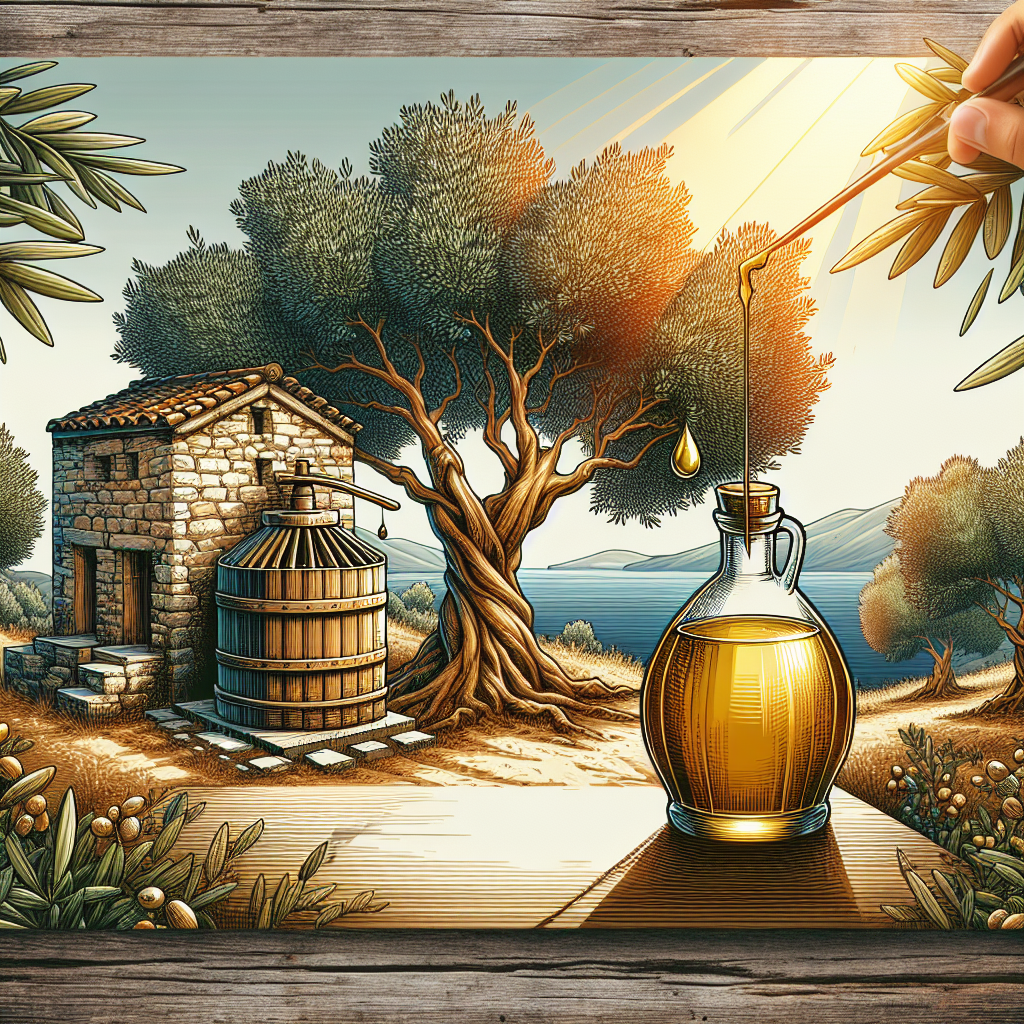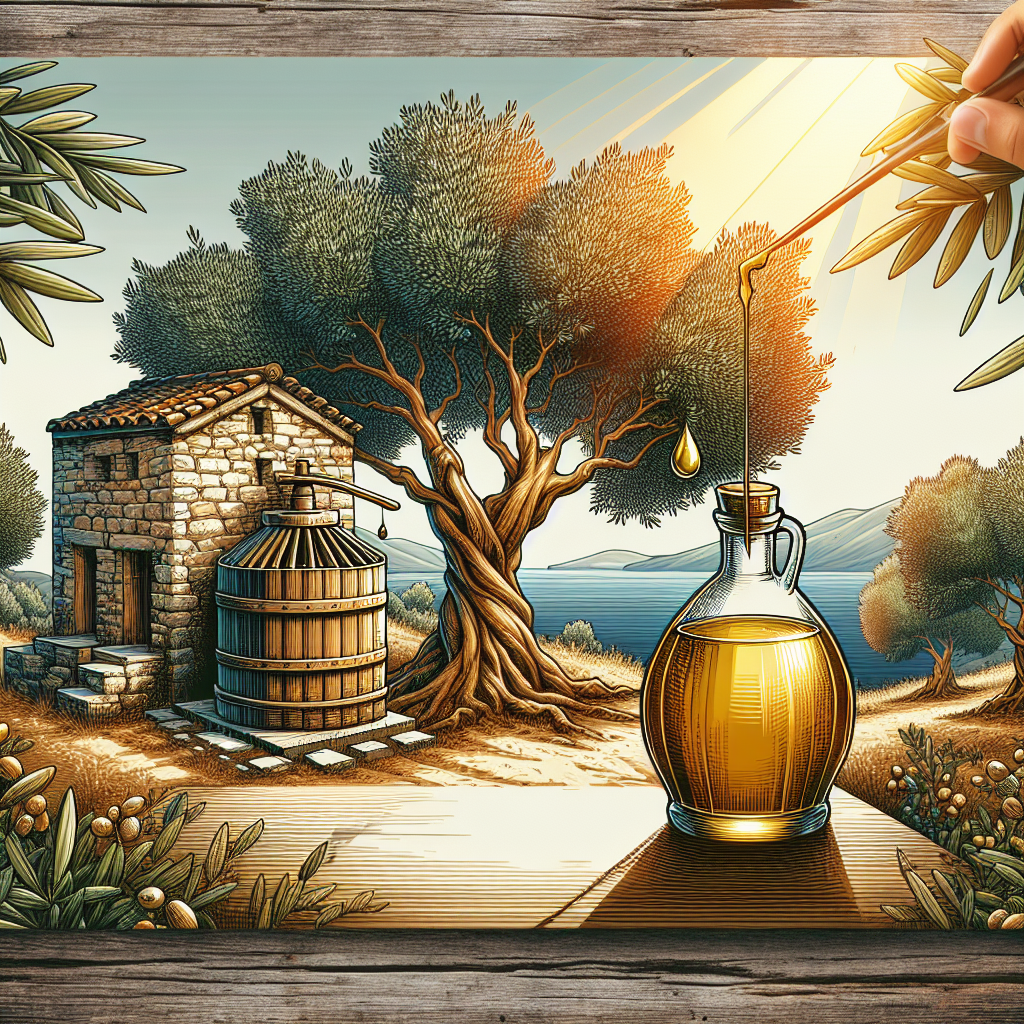Picture yourself wandering through the enchanting landscape of the Greek Islands, surrounded by lush olive groves that stretch as far as the eye can see. As the gentle breeze carries the scent of blooming flowers, you can’t help but be captivated by the rich history and unparalleled beauty of these ancient olive trees. And hidden within their centuries-old branches lies the true treasure – the liquid gold known as olive oil. Join us on a journey as we explore the olive groves of the Greek Islands, immersing ourselves in their timeless allure and discovering why this golden elixir holds a special place in the hearts and palates of locals and visitors alike.

The History of Olive Oil in Greece
The Ancient Roots
Olive oil holds a special place in Greek history, dating back thousands of years. The olive tree, also known as “the tree that gives life,” has been a symbol of prosperity, peace, and wisdom for the people of Greece. The cultivation of olives and the production of olive oil can be traced back to ancient times, where it played a significant role in the daily lives of Greeks.
The Importance of Olive Oil in Greek Culture
Olive oil has deep cultural significance in Greece. It has been used in religious ceremonies, as a source of light, for hygiene, and as a staple in cooking. In fact, ancient Greek poets referred to olive oil as “liquid gold.” It was highly valued for its numerous benefits and considered an essential part of a healthy diet.
Olive Oil Production in Modern Greece
Greece has a long tradition of olive oil production and is one of the largest producers of olive oil in the world. The country’s favorable climate, ideal soil conditions, and ancient olive groves contribute to the exceptional quality of Greek olive oil. Today, modern techniques and machinery have improved the production process, allowing for higher yields and consistent quality.
Varieties of Greek Olive Oil
Koroneiki
The Koroneiki olive is one of the most popular varieties in Greece, known for its high quality and robust flavor. It is primarily grown in the southern part of the Peloponnese region, where the climate and soil conditions are ideal for its cultivation. Koroneiki olive oil is rich in antioxidants and has a fruity and slightly peppery taste.
Athinoelia
The Athinoelia olive is native to the island of Crete and is highly regarded for its exceptional taste. It produces a smooth, buttery olive oil with a hint of sweetness. The olive trees of the Athinoelia variety are resistant to extreme weather conditions, making them well-suited for the rugged landscape of the island.
Manaki
The Manaki olive, mainly grown in the regions of Peloponnese and Central Greece, is known for its delicate and fruity flavor. The oil produced from these olives is light and golden in color, making it a versatile option for various culinary uses. Manaki olive oil is often praised for its smooth and buttery texture.
Chalkidiki
Chalkidiki olives are primarily grown in the northern part of Greece and are known for their distinctive size and shape. The olive oil produced from Chalkidiki olives is characterized by its mild and fruity flavor, making it a perfect choice for those who prefer a more delicate taste.
Throuba
Throuba olives are grown exclusively on the island of Thassos in the northern Aegean Sea. These olives are harvested when they are fully ripe and naturally dried before being pressed, resulting in a unique and intense flavor. Throuba olive oil is treasured for its rich, fruity aroma and deep golden color.
Kalamata
Kalamata olives are world-renowned and are cultivated mainly in the region of Messinia in the southwestern part of Greece. The olive oil produced from Kalamata olives has a distinct peppery flavor with fruity undertones. It is highly sought after for its exceptional quality and versatility in Mediterranean cuisine.
The Process of Olive Oil Production
Harvesting the Olives
The process of olive oil production starts with the harvest, which usually takes place in the late fall or early winter. Olives are carefully hand-picked or harvested using mechanical methods, depending on the size of the olive grove. It is crucial to harvest olives at the right time to ensure optimal oil quality and flavor.
Transportation and Storage
Once harvested, the olives are transported to the olive mill, where they are weighed and cataloged. They are then stored in large bins or silos to await processing. The time between harvesting and processing should be minimal to prevent any deterioration in the quality of the olives.
Processing and Extraction
The olives undergo a thorough cleaning process to remove any leaves, stems, or impurities. They are then crushed or pressed to release the oil. Traditional methods involve grinding the olives into a paste using large stone or granite mills, followed by pressing the paste to extract the oil. Modern methods use mechanical or centrifugal presses for a more efficient and consistent extraction process. The oil is separated from the solids and undergoes filtration and clarification before being bottled.
The Role of Olive Oil in Greek Cuisine
Traditional Greek Dishes
Olive oil is a key ingredient in traditional Greek cuisine and is used in a wide variety of dishes. From moussaka to souvlaki, Greek cuisine celebrates the rich flavors and health benefits of olive oil. It is used to sauté vegetables, marinate meats, and dress salads, adding a distinct Mediterranean touch to every dish.
The Use of Olive Oil in Salads and Dressings
Greek salads are incomplete without a generous drizzle of olive oil. The vibrant combination of fresh tomatoes, cucumbers, feta cheese, olives, and olive oil is a testament to the simplicity and elegance of Greek cuisine. Olive oil is also commonly used as a base for dressings, enhancing the flavors of mixed greens and vegetables.
Olive Oil in Baking and Desserts
Olive oil adds a unique twist to baking and desserts in Greek cuisine. It is used in a variety of sweet treats, such as olive oil cake and honey-infused pastries. Olive oil brings a subtle fruity flavor and moist texture to baked goods, making them more indulgent and healthier at the same time.

Health Benefits of Olive Oil
Heart Health and Reduced Risk of Cardiovascular Disease
Olive oil is renowned for its heart-healthy benefits. The high levels of monounsaturated fats found in olive oil can help lower bad cholesterol (LDL) and raise good cholesterol (HDL). Regular consumption of olive oil as part of a balanced diet has been linked to a reduced risk of cardiovascular diseases.
Anti-inflammatory Properties and Digestive Health
Olive oil contains natural compounds that have anti-inflammatory properties, which may help reduce inflammation in the body. It can also promote healthy digestion by stimulating the production of digestive enzymes and aiding in the absorption of nutrients.
Antioxidant and Anti-Cancer Effects
The antioxidants present in olive oil, such as vitamin E and phenolic compounds, help protect the body against free radicals that can cause cell damage and contribute to the development of chronic diseases, including cancer. Regular consumption of olive oil has been associated with a lower risk of certain types of cancer, particularly breast and colorectal cancer.
Olive Oil and Skincare
Nourishing and Moisturizing Properties
Olive oil has been used for centuries in skincare for its nourishing and moisturizing properties. Its natural fatty acids help hydrate and soften the skin, making it an excellent natural moisturizer. Olive oil is often used as a base ingredient in soaps, lotions, and creams.
Anti-aging Benefits
The antioxidants present in olive oil can help combat the signs of aging. They help protect the skin from oxidative stress caused by environmental factors, reducing the appearance of wrinkles and fine lines. Olive oil is also rich in vitamin E, which promotes cell regeneration and keeps the skin looking youthful and radiant.
Treating Skin Conditions
Olive oil is known for its soothing and healing properties, making it an effective remedy for various skin conditions. It can help relieve dryness, irritation, and inflammation, making it suitable for those with sensitive or eczema-prone skin. Olive oil can also be used to moisturize dry lips, strengthen brittle nails, and nourish dry, damaged hair.
Sustainable and Organic Olive Oil Production
Traditional Methods and Organic Certification
Many Greek olive oil producers adhere to traditional farming practices, using minimal intervention and chemical-free methods. These practices promote sustainable agriculture and respect the natural balance of the environment. Additionally, several olive oil producers have obtained organic certification, ensuring that their olives are grown and processed without the use of synthetic pesticides or fertilizers.
Preserving Biodiversity and The Environment
The cultivation of olive trees in Greece contributes to the preservation of biodiversity. Olive groves provide a habitat for various plant and animal species, including endangered ones. The adoption of sustainable farming practices helps maintain the ecological balance and protect the fragile Mediterranean ecosystem.
Supporting Local Farmers and Communities
The production of olive oil plays a vital role in the Greek economy, especially in rural areas. Many olive oil producers are family-run businesses that have been passed down through generations. By supporting local farmers and communities, consumers can contribute to the preservation of Greek olive oil heritage and help sustain rural livelihoods.
Olive Oil Tourism
Visiting Olive Groves and Olive Oil Mills
Olive oil tourism offers a unique opportunity to explore the rich history and culture of olive oil production in Greece. Visitors can immerse themselves in the picturesque olive groves, learn about the cultivation and harvesting process, and witness the production of olive oil at traditional mills. Guided tours often include educational tastings, providing a deeper understanding of the different varieties and flavors of Greek olive oil.
Tasting and Appreciating Different Olive Oils
Tasting olive oil is an art form in itself. The varying flavors and aromas of different olive oils can be explored through guided tastings. Experts can guide participants on how to assess the quality, acidity, and overall characteristics of olive oil. This experience allows visitors to appreciate the complexity and nuances of Greek olive oil and enhances their culinary knowledge.
Participating in Olive Harvesting
For those seeking a more hands-on experience, olive harvesting provides a unique opportunity to connect with nature and gain a deeper appreciation for the hard work behind olive oil production. Joining a harvesting event allows participants to experience the ancient tradition firsthand, picking olives alongside local farmers and witnessing the beginning of the olive oil journey.
The Use of Olive Oil in Traditional Medicine
Historical Uses of Olive Oil in Greek Medicine
The use of olive oil as a therapeutic agent dates back to ancient Greek medicine. Hippocrates, the father of modern medicine, praised olive oil for its various health benefits. It was used to treat ailments such as wounds, respiratory issues, and digestive disorders. Olive oil was also believed to have aphrodisiac properties and was used in ancient fertility rituals.
Scientific Research and Benefits
Recent scientific research has confirmed many of the historical uses and benefits of olive oil. Studies have shown its potential in reducing inflammation, protecting against chronic diseases, and promoting overall well-being. The Mediterranean diet, which is rich in olive oil, has been linked to longevity and a reduced risk of conditions such as cardiovascular diseases and type 2 diabetes.
Olive Oil in Aromatherapy
The aromatic properties of olive oil make it a popular choice in aromatherapy. Inhaling the aroma of olive oil can promote relaxation, reduce stress, and uplift the mood. Olive oil can also be used as a carrier oil to dilute essential oils for topical application, enhancing their therapeutic effects.
Preserving Greek Olive Oil Heritage
Challenges and Threats to Olive Oil Production
Despite its long-standing significance, Greek olive oil production faces various challenges. Climate change, pests, and diseases pose a threat to olive trees, affecting yields and quality. Additionally, competition from large-scale producers and fraudulent activities in the olive oil market undermine the reputation and authenticity of Greek olive oil.
Preservation Efforts and Cultural Importance
Efforts are being made to protect and preserve Greek olive oil heritage. Organizations and institutions are working closely with olive oil producers to ensure sustainable and traditional practices are upheld. The cultural importance of olive oil is celebrated through festivals and events, showcasing the history, craftsmanship, and flavors of Greek olive oil.
Promoting Greek Olive Oil Internationally
Greek olive oil has gained recognition worldwide for its exceptional quality and superior taste. In recent years, there has been a growing international demand for Greek olive oil, reflecting the appreciation for its distinct flavors and health benefits. Promoting Greek olive oil internationally not only supports the local economy but also allows consumers around the world to experience the liquid gold of the Greek Islands.
With its rich history, diverse varieties, health benefits, and cultural significance, olive oil continues to be a cherished and essential ingredient in Greek cuisine and beyond. Whether used for culinary, skincare, or medicinal purposes, Greek olive oil stands as a testament to the ancient wisdom and enduring legacy of this liquid gold. Embrace the essence of Greece and enjoy the flavors, aromas, and benefits that olive oil brings to your table and life.
